Discover Zane Hodges Library
Zane Hodges Library

Zane Hodges Library
Author: Zane C. Hodges
Subscribed: 24Played: 955Subscribe
Share
Description
Zane Hodges Library features messages on the Bible by Zane C. Hodges. Zane ministered at Dallas Theological Seminary for 27 years as Professor of New Testament. Zane also ministered at Victor Street Bible Chapel in Dallas, Texas for over 50 years and published a number of books focusing on the free gift of eternal life by faith alone in Jesus Christ alone and on the opportunities for eternal rewards for believers. Zane was involved with the founding of the Grace Evangelical Society, served on its board of directors, and wrote and spoke for GES. Zane was known for his faithfulness to the text of the Bible through study and prayer. His life reflected a biblical joyful living faith, as he was a friend and minister to many from all walks of life and all ages.
Zane desired for others to know and believe in Jesus for the absolutely free gift of eternal life. As Jesus said, "Amen, amen, I tell you, whoever believes in Me has eternal life." (John 6:47)
Zane also desired for believers to grow and endure in their faith, so that believers may have the privilege of co-reigning with the Lord Jesus Christ. In 2 Timothy 2:17, believers are told, "If we suffer, we shall also reign with him."
Zane desired for others to know and believe in Jesus for the absolutely free gift of eternal life. As Jesus said, "Amen, amen, I tell you, whoever believes in Me has eternal life." (John 6:47)
Zane also desired for believers to grow and endure in their faith, so that believers may have the privilege of co-reigning with the Lord Jesus Christ. In 2 Timothy 2:17, believers are told, "If we suffer, we shall also reign with him."
200 Episodes
Reverse
Zane Hodges explains James 2:14-26 by providing an overview of the entire Epistle of James. Zane explains the expression "save your souls" in James 1:21, and demonstrates that "save" in James is about saving your earthly lives not salvation from hell. Zane show the Greek word for "trial" and "temptation" have two meanings, (1) troubles and (2) temptation to do evil. Justification before God by faith versus justification before men by works is explained. Dead faith is when we stop acting on what we believe. In that instance faith becomes like a dead body, a dead faith is unproductive. How do we keep our faith alive? By acting on what we believe. When people see us acting on what we believe, then we are justified by works before men. Other passages: Matthew 7:24-27; Proverbs 11:19; Romans 4:2; Hebrews 11:31 #deadfaith #saveyoursoul #james2 #justifiedbyfaith #justification May 24, 1992
On May 24, 1992, Zane Hodges answered the following questions at Coast Bible Church: 1:44 - In Isaiah 40:1-2, who is the speaker asking to do the comforting, the nations of the world or is God comforting? 3:04 - In what sense should believers view their adoption by God? 4:11 – What is the difference in the two terms for “child” and “son” in Greek? 5:11 – Is there a difference between being born of God and receiving the gift of the Holy Spirit? 7:03 – How can we differentiate between the new creation of God, which I am, and the flesh and not be guilty of a dualistic view of man like the Gnostics? What is Gnosticism? 10:26 – In 2 Corinthians 5:11, regarding the “Knowing, therefore the terror of the Lord, we persuade men”, in what sense will Christians experience the terror of the Lord if they fail to persuade men? 13:27 – 1 Corinthians 4:5 speaks of “the hidden things of darkness and the counsels of men’s hearts” being brought to light, in what sense will our failures or sins be brought up at the Judgment Seat of Christ and how does this fit the teaching of forgiveness and cleansing of sin and of God remembering our sins no more (Hebrews 10:17)? 21:06 – Does belief require a commitment? 21:38- Are there different types, degrees, or kinds of faith, such as weak versus strong or superficial versus deep? What sort of faith results in salvation? How much faith do you have to have to be saved? 27:45 – What are works? Which works are acceptable to God? Is fruit the same thing as works? 28:57 – Do works or fruit or both prove that faith exists? If so, why is proof necessary? 30:10 – Is it our job to be fruit inspectors or work detectors? Are we called to judge ourselves and others? 31:05 – Can we be assured of our own salvation? 31:15 – Can we have assurance of another person’s salvation? 36:21 – In 2 Corinthians 5:1-10, if absence from this body means to be in the instant presence of the Lord, when will we be judged in verse 10? When shall the dead in Christ rise in 1 Thessalonians 4:16? Doesn’t the Greek word for “absence” in 2 Corinthians 5 suggest waiting for something while dead? Don’t other passages suggest the waiting in the care of Christ until they arise first, 1 Corinthians 15:6, 18; 1 Thessalonians 4:13,15; 2 Peter 3:4? 39:00 – What about the idea of soul sleep for dead believers? Why do we sleep until we receive our glorified physical bodies? 40:55 – If believers will not come into judgment, John 5:24, why do they still go before the Judgment Seat of Christ? 42:25 – What about the idea that dead believers prior to receiving their resurrected bodies experience time outside of the normal time-space continuum? That is one day is like a thousand years, and a thousand years as one day, so it will seem like sleep and the next conscious experience will be awakening at the Judgment Seat of Christ. Some explain soul sleep this way. 43:50 – Is there an age of accountability? 45:02 - Is the term “justification” used differently by James than by Paul? 46:16 – Explain the living creatures in Ezekiel 1:15. 48:40 – When Saul goes to the witch of En Dor and she brings up Samuel, wouldn’t we have assumed that Samuel is with God, so how could Samuel ascend out of the earth? (1 Samuel 28) 50:25 – What is the bare minimum components of the Gospel or evangelistic message? Do you have to mention sin? What is the information that must be communicated? 53:15 – When do we inherit the kingdom of God? What does it mean to inherit the kingdom? 55:56 – What about the omission of the tribe of Dan from the list of the tribes of Israel in Revelation 7? 1:01:09 – Do we lose rewards in heaven if we are recognized for them today? 1:02:21 – Is Matthew 25, are the goats cast into the outer darkness? 1:02:43 – Why do the goats in Matthew 25:43 go into the everlasting fire? What is going on with the judgment of the sheep and the goats in Matthew 25? 1:05:44 – Is one reason for the omission of the tribe of Dan in Revelation 7, is that the tribe of Dan was one of the first tribes to fall into idolatry? 1:06:46 - Is the 144,000 in Revelation 7 sealed so that they will survive the entire tribulation? 1:08:24 – Is the 144,000 the total sum of believing Israel or the number of missionaries? 1:10:08 – What are you looking forward to in the coming kingdom?
During this prophetic congress Zane Hodges surveys the following passages with respect to the events of the Tribulation after the rapture of the church: Daniel 9:24, 26-27; 11:36-12:1 Revelation 8:1; 9:12; 11:3-14; 12:13-17; 16:13-14, 16; 17:9-13, 17-18; 19:11, 19-21 57:08 – Is the United States mentioned anywhere in prophecy? 59:18 – Is the rapture near? 1:10:30 – Where do Christians go at the time of the rapture? Other passages referenced: 2 Peter 3:10-13; Revelation 11:1-14; 2 Thessalonians 2:1-12; Revelation 8:13; Revelation 9:18; 1 Timothy 4:1-3; Matthew 4:8-11; Luke 4:5-8; Psalm 2:1-3; Revelation 13; Revelation 17:16; Revelation 18; Ezekiel 38-39; Revelation 20:8; Revelation 12, 14; 1 Thessalonians 5:3; Job 1-2; 1 Thessalonians 4:17. #tribulation #rapture #manofsin #beast #endtimes #prophecy
Zane Hodges concludes his series on the Epistle to the Hebrews by answering the following questions: 0:57 – Does Hebrews 10:26 refer to Old Testament sacrifice? 2:14 – Did you ever hold to a “loss of salvation” view or a “never believed” view regarding the problem passages in Hebrews? 7:10 – How do you understand the concept of “righteousness” in Scripture and in particular the book of Hebrews? 9:15 – How are righteousness and justification related? 11:00 – Could you walk us through Hebrews 12:8, since it is often used for false professors? 13:20 – What about the sin that so easily ensnares us in Hebrews 12:1? What is that sin? Is that unbelief? 14:14 – Is the condition in Hebrews 6:4-5 regarding those that are impossible to renew the same condition as those in Romans 1 being subject to God’s wrath? 17:35 – What should our responsibility to the person in Hebrews 6:4-5 20:20 – Is this the joy of bringing one back? 21:43 – If the earthly tabernacle is patterned after the heavenly tabernacle, what does that tell us about what heaven is like? Now that Christ is seated and entered into the holies of holies and yet Christ is still the minister of this tabernacle, what is Christ actually doing? 26:22 – How is that different from the intercessory ministry of the Holy Spirit? 26:42 – Is there anything we can do for an apostate Christian? 29:09 – Do you think apostasy is on the rise in our liberal society of 2002? 31:12 – How does a believer deal with an apostate? Do they treat them as a non-believer or as a believer who has fallen away? 32:54 – How would you respond to a Calvinist who says regarding an apostate friend, that your friend never believed or that only God knows if he is saved? 36:17 -In 1 John 5:16-17, what is the meaning of “There is sin leading to death. I do not say that he should pray about that.”? 41:38 – Can you explain the psychology and context of Hebrews 12:15, “looking carefully lest anyone fall short of the grace of God; lest any root of bitterness springing up cause trouble and by this many become defiled” 44:37 – Is Hebrews 12:15 set opposed in a sense to Hebrews 6:4 and 10:25 and not having the tools to deal with those who have forsaken the assembly? 45:19 – Where do you draw the line between wandering away from the Lord and complete apostasy, is there a gray area? How do you classify someone as an apostate? Can an apostate give back his eternal life? 47:26 – Can an apostate grow spiritually? 48:28 – What happens with an apostate and his eternal rewards, can he lose his eternal rewards? 50:02 – Can you explain1 John 5:18? “We know that whoever is born of God does not sin; but he who has been born of God keeps himself, and the wicked one does not touch him.” #hebrews
Zane Hodges continues his series on the Epistle to the Hebrews by surveying chapters 5 through 12 and answering the following questions: Is the problem passage in Hebrews 6:4-8 about a believer and does the passage teach that salvation may be lost? What is the meaning of “sanctified” in the Epistle to the Hebrews? Are there worse punishments for believers than immediate physical death? What is the response of faith to the wonderful and challenging truths presented in the Book of Hebrews? What is the fundamental theme in the Book of Hebrews? Verses referenced: Genesis 22:17; Psalm 95; Lamentations; Haggai 2:6
Zane Hodges continues his series on the Epistle to the Hebrews by surveying chapters 2 through 4 and answering the following questions: What is salvation in the book of Hebrews? What is the future for our Lord Jesus Christ and how can we become partners of the King? Who is going to rule the future world? Who is Psalm 8 about? What is “rest” in the book of Hebrews? In what sense did Joshua not give the Israelites rest? Why does there remain a “rest” available to the people of God? Verses referenced: Hebrews 1:5-14, 13; Psalm 2:7-8; 2 Samuel 7:14; Psalm 45:1-6; Psalm 97:7; Psalm 110:1-4; Psalm 8, 95; Deuteronomy 3:18-20; 12:9-10; Revelation 2:26-27; 3:21
In part one of this four part series on the epistle to the Hebrews, Zane Hodges provides an overview and answers the following questions: When was Hebrews written? Who is the author of the Epistle to the Hebrews? Who is the writer of Hebrews addressing? What is the background of the book of Hebrews? What is the general structure of the epistle? Verses referenced: Hebrews 13:23; 1 Corinthians 9:1,4-6; Acts 14:14; Hebrews 13:24; Hebrews 10:32; Hebrews 6:10; Hebrews 5:11; Hebrews 13:18,19; Hebrews 2:5; Acts 2:10, 6:9; 13:1, 11:19-20; Mark 15:21
Questions and Answers August 27, 2005 Grace Evangelical Society Southern California Regional Conference Zane Hodges, Bob Wilkin and Arch Rutherford Questions asked: 0:27 Do we need to believe that Jesus is God? 4:02 – What part does assurance have in believing? Is a person saved if they have never been 100% sure of their eternal security? 5:55 – Does the sanctification process only begin when Jesus is Lord of all areas of one’s life? 7:03 – Explain the difference between the baptism of the Holy Spirit and the indwelling of the Holy Spirit. 9:30 – Does Free Grace theology the need for progressive sanctification? 11:30 – Please give suggestions on how to help churches who don’t present a clear gospel on how to direct them to present a clearer gospel. How can reach churches who present a false Gospel? 15:38 - If God chose some to election, then He did not choose others, how do you reconcile this with God’s love and justice? 18:45 – What do you think of 1 Timothy 2:4, “who desires all men to be saved and to come to the knowledge of the truth.”? 21:32 – What is the difference between the Gospel in 1 Corinthians 15, the Gospel of the kingdom, and the Gospel that gives us eternal life? 27:22 What did Old Testament Saints believe in order to be saved? 31:25 If a person believes in Jesus for eternal life and later no longer believes in Jesus for eternal life. Is that person still saved? 32:30 – What is the Dispensationalism? 34:29 - Can you explain what is living water in John 4:14 and John 7:38? 37:36 - Acts 10:43, please interpret that again? 41:17 – Is it possible that Martha understood the Son of God in John 11, to be a reference to the promised Messiah in the Old Testament instead of implying deity? 49:23 –Given that Satan is at work blinding men to the gospel (2 Corinthians 4), would you expect some sort of covering over each of the 4 soils in the parable of the soils, where the seed could not go in unless God made it possible?
At the 2008 Grace Evangelical Society National Conference, Zane Hodges continues his discussion of Jesus' Last Discourse (Upper Room Discourse, John 13-17) and demonstrates how it fits the evangelistic purpose of the Gospel of John (John 20:30-31), leading people to believe in Jesus for eternal life. In part 2 of this 2 part series of messages, Zane covers (1) the Son of Zebedee, (2) the Genre of John's Gospel, (3) Death Scenes in Ancient Biography, (4) the Death of Jesus the Christ, and (5) Miraculous Signs and Literary Structure. "Introducing John's Gospel: Miraculous Signs and Literary Structure" (Part 2 of 2) by Zane C. Hodges https://faithalone.org/wp-content/uploads/2016/12/Autumn2008.pdf
Some have mistakenly thought that Jesus' Last Discourse (Upper Room Discourse, John 13-17) does not fit the evangelistic purpose of the Gospel of John (John 20:30-31). Instead of viewing John 13-17 as evangelistic, they conclude that Jesus' Last Discourse was written to believers to instruct them on how to live the Chistian life. At the 2008 Grace Evangelical Society National Conference, Zane Hodges demonstrates that Jesus' Last Discourse (Upper Room Discourse) was written for the express purpose of leading people to believe in Jesus for everlasting life. In part 1 of this 2 part series of messages, Zane covers (1) a Fundamental Premise, (2) the Historical Purpose of the Last Discourse, (3) the Audience of John's Gospel, and (4) the Literary Character and Purpose of the Last Discourse. "Introducing John's Gospel: In the Upper Room with Jesus the Christ" (Part 1 of 2) by Zane C. Hodges https://faithalone.org/wp-content/uploads/2020/09/Hodges.pdf
Zane Hodges continues his exposition of the Sermon of the Mount beginning with the thematic statement in Matthew 5:13-16 and continuing with the beginning of the body of the sermon in Matthew 5:17-24. Why is there an impression in Matthew 5:17 that Jesus came to destroy the Law or the Prophets? What is meant in Matthew 5:18 that all the law will be fulfilled till heaven and earth pass away. The Lord Jesus Christ is teaching us a standard by which we can live, which is nothing more or less than the righteous standard of His coming kingdom. An outline of the Sermon of the Mount: Prologue: Matthew 5:3-12 Thematic Statement 5:13-16 Body of Sermon: 5:17-7:12 Conclusion: Matthew 7:13-27 Passages mentioned: Nehemiah 8:17; Zechariah 14:16-19; Luke 18:9-14, 1 John 2:22; Matthew 25:32-46.
Zane examines why there are 3 Gospels for discipleship, Matthew, Mark and Luke, and what audience was each Gospel directed to? Luke – Greek Mark – Roman Matthew – Hebrew How does Matthew’s emphasis for discipleship to the Hebrew audience effect our understanding of the Sermon of the Mount? Matthew is discipleship with the King Jesus. An outline of the Sermon of the Mount: Prologue: Matthew 5:3-12 Thematic Statement 5:13-16 Body of Sermon: 5:17-7:12 Conclusion: Matthew 7:13-27 In Part 1, Zane explains the Prologue and covers the Beatitudes. The stress of the Beatitudes are on being and not doing. Discipleship to Jesus Christ is character driven not activity driven. The beginning point of all real discipleship to Jesus Christ has to be a recognition that God wants to make you the person that He wants you to be.
If you think it is bad to lose communication with a partner in marriage, then it is even worse to lose communication with God. Did you ever stop to think what a tremendous privilege it would be to have Jesus Christ as a guest in your home? That was exactly the opportunity given to two ladies in this passage by the names of Mary and Martha. When we turn our attention to the Word of God, it ought to be as if God and I are alone in the world. God must have our undivided attention. The more you complain about your lives, the less you will be able to hear God speaking to your heart through His Word. One of the main problems that we have in the Christian life, is that we think we need to do lots of things, that we do not need to do. We overload ourselves with things that we do not have to do, so that we do not have time for the things we really need to do, that is time for the Word of God. Other passages mentioned: John 11; John 6:4-13; Matthew 14:32-38. This message was given in 1984 at Christ Bible Fellowship of Del Rio, Texas, pastored by Chip Brunott.
April 18, 1988. Zane gives a seminar on Romans 2:1-16 focusing in particular on verses 5 through 13. Warning: audio quality on recording is very poor. Transcript available here: https://drive.google.com/file/d/1o10CP0at0PFf5UEkbNFR2sl-ItkZ5yUh/view?usp=sharing
During this Question and Answer session on May 23, 2004 at Coast Bible Church, Costa Mesa, California, Zane Hodges answers the following questions with a focus on the Christian life: 6:01 – In what sense is it appropriate to speak and sing of Jesus as King, when Jesus is not yet reigning over the earth (John 18, Act 17, 1 Timothy 1, Revelation 19)? 7:41 – What are the dangers of new movements like Christian “spiritual direction” and “contemplative spirituality”? 9:33 – Explain 1 Chronicles 22, regarding David being prohibited from building God’s house because of shed blood and wars he had fought, but David had been told by God to shed this blood. 11:03 – Why was Solomon allowed to build God’s temple, since he also was not very good? 11:54 – 1 Corinthians 6, please explain passage regarding sexual immorality. 15:49 – Could the expression that “every sin that a man does is outside the body” in1 Corinthians 6:18 be a Corinthian motto? 17:55 – In what sense is the inner promptings that we have in our lives coming from the Holy Spirit working in us versus our perfect inner man wanting to do what is naturally right? 22:41 – Is there a two-pronged approach to transformation, (1) transforming the mind and (2) bringing our body to subjection? 26:59 – Is there a specific will of God for every decision? Does God lead me by feelings? 32:07 – How do you respond to critics of the Bible who say that God in the Old Testament (wrath) is different from God in the New Testament (mercy and grace)? 40:01 – In Philippians 3:10-11, referring the “outward resurrection of the dead”, could this be referring to Christ’s outward resurrection of the dead instead of Paul’s outward resurrection of the dead? 44:25 – Is there a balance needed between serving Jesus Christ versus serving God the Father?
In this message given at Christ Bible Fellowship of Del Rio, Texas, pastored by Chip Brunott, Zane Hodges challenges believers to examine their spiritual wardrobe. What are the qualities that make for a well-dressed Christian?
In this message given at Christ Bible Fellowship of Del Rio, Texas, pastored by Chip Brunott, Zane Hodges preaches on the raising of Jairus’ daughter from the dead and the healing of a woman having a flow of blood. When we have reached the end of the line and when we have run out of our own resources, God is there and for God nothing is impossible when you put your trust in God and His word.
In this the final study of four studies on Jesus' prophetic ministry in the Olivet Discourse (Matthew 24:1-25:46) Zane C. Hodges focuses on the application section of the Olivet Discourse, and in particular the four parables of the Unprepared Servant, the Ten Virgins, the Talents, and the Judgment of the Sheep and the Goats. There is also an extended discussion regarding the Judgment Seat of Christ. Outline/Structure: Prelude 24:1-3 Exposition (Explanation of End of the Age/Day of the Lord) 24:4-35 Overview of Day of the Lord from beginning to end 24:4:-14 Matthew 24:9-14 (last half of the Tribulation, Revelation 7) Matthew 24:15-31 - Midpoint of the Day of the Lord (detailed consideration of the last part of the Day of the Lord) Matthew 24:23-28 Period of intense religious deception, Matthew 24:29-31 – Second coming of Jesus Christ (Armageddon) Conclusion to this unit of the Olivet Discourse 24:32-35 Introduction to Application 24:35-42 (When will the Tribulation take place? Time unknown.) Application with 4 parables 24:45-25:46 Matt 24:45-51 and Matt 25:14-30 parables addressed to church age saints. Matt 25:1-13 and Matt 25:31-46 2nd and 4th parables addressed to tribulation saints. Other passages mentioned: 1 Thessalonians 5:1-3 2 Peter 3:4-10 Matthew 22:1-14 1 John 2:28 Revelation 14 2 Corinthians 5:10-11 Coast Bible Church, May 24, 1995
In this the third of four studies on Jesus' prophetic ministry in the Olivet Discourse (Matthew 24:1-25:46) Zane Hodges continues to examine the events of the second half of the Tribulation looks climaxing at the battle of Armageddon. Matthew 24:15-35. Outline/Structure: Prelude 24:1-3 Exposition (Explanation of End of the Age/Day of the Lord) 24:4-35 Overview of Day of the Lord from beginning to end 24:4:-14 Matthe 24:15 - Midpoint of the Day of the Lord (detailed consideration of the last part of the Day of the Lord) Matthew 24:23-28 Period of intense religious deception, Conclusion to this unit of the Olivet Discourse 24:32-35 Introduction to Application 24:35-44 (Time Unknown) Application with 4 parables 24:45-25:46 Matt 24:45-51 and Matt 25:14-30 parables addressed to church age saints. Matt 25:1-13 and Matt 25:31-46 2nd and 4th parables addressed to tribulation saints. Other Passsages: 2 Thessalonians 2:9-12; Revelation 17:7-18; Revelation 13:3-15; Mark 5:1-20; Revelation 18; Revelation 16:13-16; Revelation 19:11-21; Zechariah 14:1-9, 12-15; Revelation 12:13-17; Revelation 16. May 23, 1995
In this the second of four studies on Jesus' prophetic ministry in the Olivet Discourse (Matthew 24:1-25:46) Zane Hodges looks at the coming world crisis described in Matthew 24:15-35. Outline/Structure: Prelude 24:1-3 Exposition (Explanation of End of the Age/Day of the Lord) 24:4-35 Overview of Day of the Lord from beginning to end 24:4:-14 Midpoint of the Day of the Lord (detailed consideration of the last part of the Day of the Lord Conclusion to this unit of the Olivet Discourse 24:32-35 Introduction to Application 24:35-44 (Time Unknown) Application with 4 parables 24:45-25:46 Matt 24:45-51 and Matt 25:14-30 parables addressed to church age saints. Matt 25:1-13 and Matt 25:31-46 2nd and 4th parables addressed to tribulation saints. Other passages mentioned: Daniel 9:24-27; Rev 8-9; 2 Thess 2:1-5; Daniel 11:36-12:1-4; Revelation 13; Revelation 11; Revelation 12:13-17; Revelation 16; 1 Thessalonians 5:1-3; 2 Thessalonians 2:11-12 May 22, 1995


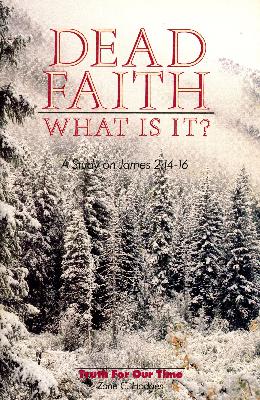


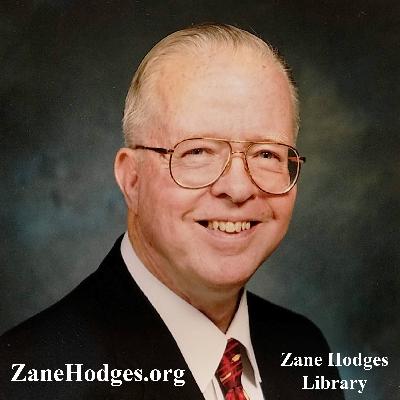
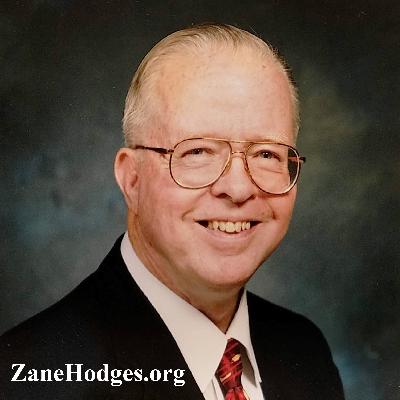
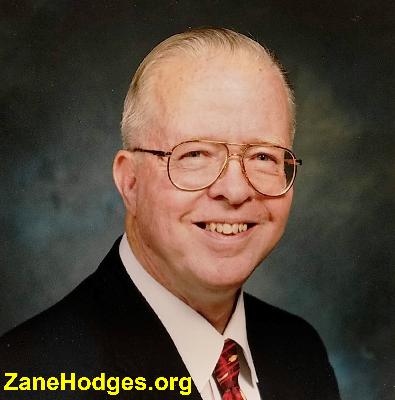
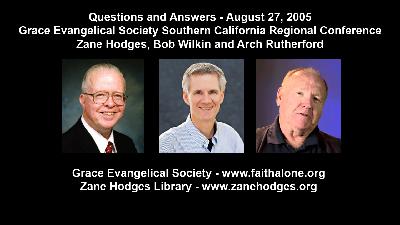





I pray more people subscribe and listen...very valuable insight. God truly used Brother Zane.